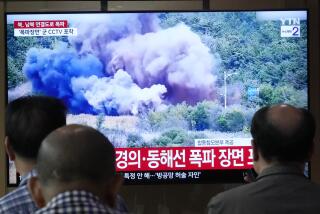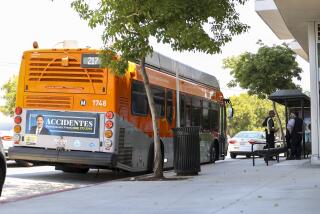Koreas Set a Date for Rail Project
SEOUL — After years of delays, the two Koreas on Friday agreed to begin work Sept. 18 to connect railroad lines across the mine-infested demilitarized zone that has divided the peninsula for half a century.
Economic officials meeting here also set an ambitious goal of connecting the first of two lines by the end of this year. Roads alongside the railway would also be repaired under the agreement.
South Korea needs rail lines through the North to be connected to China and Russia. That would transform what is, in effect, an island to a part of the Asian continent.
North Korea, meanwhile, desperately needs the fees it could earn transporting cargo from South Korea to bootstrap its faltering economy.
“This is a win-win proposition,” said Cho Myong Chul, a North Korean-born economist who defected to South Korea and now runs an economic institute. “South Korea could save a huge amount of money in its transportation costs, while the fees could really help the North Korea economy.”
The announcement on the railroad deal is just one of several indicators that the glacial pace of the reconciliation process between North and South Korea is shifting to an express track.
A South Korean newspaper, Munwha Ilbo, reported Friday that North Korean leader Kim Jong Il might live up to his famously unfulfilled promise to reciprocate South Korean President Kim Dae Jung’s June 2000 visit to Pyongyang. The paper suggested that the visit could take place during the Asian Games, which will be held in the South Korean city of Pusan starting Sept. 29.
In another surprise, the Japanese government announced that Prime Minister Junichiro Koizumi on Sept. 17 will visit North Korea.
The reconnection of the North and South Korean railroads that were destroyed during the 1950-53 Korean War is one of the most important objectives of South Korean President Kim’s “sunshine policy,” for which he won the Nobel Peace Prize in 2000. But by the tally of one South Korean newspaper, JoongAng Ilbo, there have been eight previously announced deals on the railroad, all of which have come to naught.
South Korean officials said Friday that they expected a better prognosis for this agreement.
“Up until now, we haven’t had a date. Now we do,” said Kim Jung Ro, a spokesman for the South Korean Unification Ministry. The work on the first line could be finished within three months because there is only an 11-mile stretch that is incomplete. Most of it extends north from the demilitarized zone to the North Korean city of Kaesong, where it would link up with existing lines.
“If they want to, the North Koreans can mobilize soldiers, students and volunteers and get the work done very quickly,” the spokesman said.
South Korea completed its part of the railroad this year, investing an estimated $150 million for track improvements and new stations--including the Dorasan facility, which President Bush visited in February.
Cynics say that the seeming flurry of activity has much to do with South Korean political considerations. South Korea’s President Kim is anxious to see the railroad completed before his term expires in February. The railroad would certainly help his favored successor, Roh Mu Hyun, who faces a tight election Dec. 19 against conservative Lee Hoi Chang. Lee advocates tougher measures toward North Korea.
“This is the Korean version of the October surprise,” said North Korea expert Lee Chung Min, referring to the habit of American incumbents of pulling favorable news out of their hats just before elections. He suggested that the North Koreans would be on their best behavior for the next few months in an effort to swing the election.
“I would imagine the groundbreaking will take place as scheduled,” he said. “But they can pop all the champagne bottles they want; what matters is when they complete construction and when this railroad is up and running.”
Although the railroad was agreed upon earlier, the North Korean military has been reluctant to commit itself to the degree of cooperation with the South Korean military necessary to connect the lines within the demilitarized zone.
For Friday’s deal, South Korea upped the amount of rice it is donating this year to the North from 300,000 to 400,000 tons. It is also donating 100,000 tons of fertilizer.
If the railroads are completed, one line would go from Seoul to Shinuiju, a North Korean city near the Chinese border. The other line, which under the agreement should be completed by spring, runs along the east coast of the peninsula.
North Korea’s leader met last week with Russian President Vladimir V. Putin in Vladivostok to discuss the railroad.
More to Read
Sign up for Essential California
The most important California stories and recommendations in your inbox every morning.
You may occasionally receive promotional content from the Los Angeles Times.










